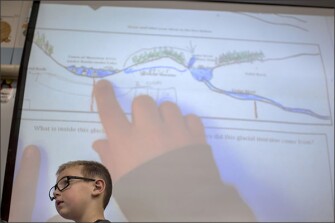From cybersecurity to school safety, privacy to personalized learning, and social media to media literacy, it’s been a busy 12 months on the education-technology beat.
Here are a dozen of Education Week’s biggest K-12 technology stories of the year, rounded up for your holiday reading pleasure.
1. They Hacked Their School District When They Were 12. The Adults Are Still Trying to Catch Up.

Cybersecurity is suddenly a major issue for K-12 public schools now targeted by phishing scams, ransomware attacks, and all manner of cyber disruptions. But what happens when the hackers are your own students? This profile of Rochester Hills, Mich., 9th graders Jeremy Currier and Seth Stephens raised all kinds of questions about schools’ weak cybersecurity practices, frequent inability to tap into the technology talents of their most gifted students, and uncertainty over how to respond to students who cross the line.
2. How (and Why) Ed-Tech Companies Are Tracking Students’ Feelings

A federally funded research project in which 200,000 Florida middle schoolers had their every keystroke tracked as part of an effort to detect when children using a math software program feel happy, bored, or engaged? An effort by publishing giant Pearson to covertly test “social-psychological” messages in its computer science software? Those were just two of the examples in this story exploring the ways the ed-tech sector is trying to better track students’ emotions.
3. School Shootings Now Unfold on Social Media. Here’s What Educators Need to Know

When a gunman opened fire inside Marjory Stoneman Douglas High School in Parkland, Fla., in February, the tragedy unfolded in real-time on social media. Platforms such as Instagram and Snapchat also became a significant part of the investigation into the shooter’s history and motivations, as well as the Broward County school district’s response. And in the months since the attack, a host of related technologies—from social-media monitoring, to reporting apps, to facial recognition systems, to panic buttons—have become part of efforts by school districts around the country to prevent the next catastrophe.
4. FBI Raises Alarm on Ed Tech and Student Data Privacy, Security

The September FBI alert was about as direct as it gets: “The widespread collection of sensitive information by ed tech could present unique exploitation opportunities for criminals.” And the privacy concerns raised by the federal government were driven home by a flurry of related stories throughout the year. Just two examples: a major study showing that thousands of Android apps were improperly tracking children, and the concerns raised about the introduction of voice-activated speakers into the classroom. Making matters worse, in December, the U.S. Education Department’s own Inspector General blasted the feds for poor enforcement of the nation’s main student-data-privacy law—which Education Secretary Betsy DeVos now wants to see rewritten.
5. Personalized Learning Still Means Whatever People Want It To Mean

Ask a dozen different educators what “personalized learning” is, and you’re likely to get a dozen different answers. Education Week’s November special report on the subject examined the opportunities and pitfalls that come with this kitchen-sink approach to disrupting America’s schools, as well as big questions about whether it’s actually a good idea to give students more “voice and choice” in their own learning, and why some personalized-learning models end up feeling less personal.
6. What Principals Really Think About Tech

Education Week’s other big technology special report this year revolved around a national survey of 500 school leaders around the country. The findings revealed what seemed to be a significant contradiction: Even as principals reported being worried about technology’s potential harmful effects, they described welcoming technology into their own buildings and classrooms. The report looked at how this dynamic played out around issues related to screen time, social media, personalized learning, and computer science.
7. With Risky Teen Drama, Facebook Further Blurs the Line Between Real and Fake

Throughout 2018, Facebook generated headlines for all the wrong reasons, including when founder and CEO Mark Zuckerberg got dragged before Congress to address a host of scandals around privacy and the spread of disinformation. For K-12 schools, much of the impact was around issues of media literacy and how to help students figure out what’s true online. This story about SKAM Austin, the company’s platform-hopping, wildly authentic, under-the-radar-but-hugely-popular-with-teens foray into original programming, explored just how challenging that’s becoming.
8. Computer Science for All: Can Schools Pull It Off?

Just how massive an undertaking is it to introduce an entirely new discipline into every K-12 school in America? This story provided a 30,000-foot view of the incredible successes and remaining challenges faced by the Computer Science for All movement. Coverage throughout the year examined states’ continuing embrace of computer-science standards and policies, the role of Silicon Valley, and a burgeoning effort to promote accessibility for students with disabilities.
9. Even for Districts Leading Interoperability Push, Journey Is Just Beginning

No issue on the ed-tech beat is quite as un-sexy or important as interoperability. This October report not only profiled one of the school districts leading the push to make data-sharing between schools and vendors more seamless and secure, but also focused on advice, survey data from the field, and words of caution for schools just beginning their efforts on this front.
10. How an Online Tutor Became a ‘Math Celebrity’

And just to show we can have some fun here at Digital Education, too, we’ll close with this profile of Darnell Boursiquot—an online math tutor who is greeted by star-struck, Sharpie-wielding teens in schools all across Florida.
Thanks for reading, and Happy Holidays and Happy New Year, everyone!

